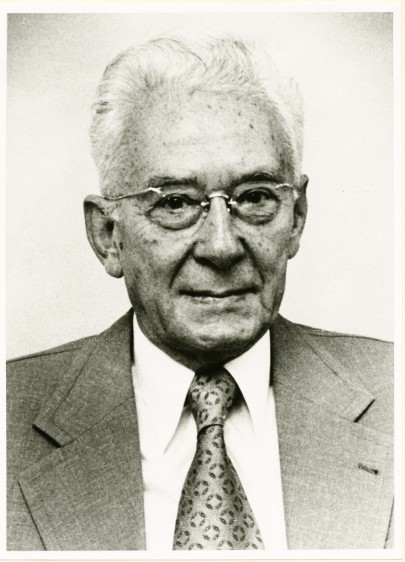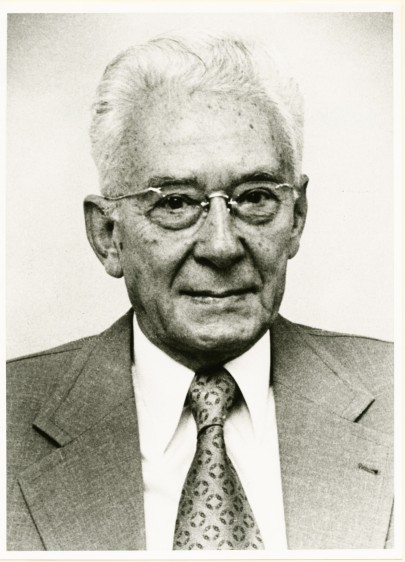Time machine
60 years ago: Karl Küpfmüller, a pioneer in electrical engineering, becomes emeritus professor
2023/05/03 by Calvin Wenner
Karl Küpfmüller was born on 6 October 1897 in Nuremberg, where he attended elementary and secondary school until 1913. This was followed by an apprenticeship (1913-1915) and at the same time attendance at the engineering school “Technikum Nürnberg” until 1919, interrupted by military service in the years 1917-1918. From 1919 to 1921 Küpfmüller worked at the Telegrafenversuchsamt Berlin (telegraph testing office), and also passed his Abitur in 1920 at the Oberrealschule Berlin Steglitz and subsequently attended lectures at the University of Berlin.


From 1921 onwards, he worked as a senior engineer at Siemens & Halske AG in Berlin. Due to his practical and scientific successes, Küpfmüller was appointed full professor of electrical engineering at the Technical University of Danzig in 1928. In 1935 he accepted a call to the Technische Hochschule Berlin before returning to Siemens & Halske AG in 1937. He continued to teach as an honorary professor and was very successful in his research on systems theory, an interdisciplinary discipline of the engineering sciences, which earned him the nickname “father of systems theory”.
During the National Socialist era, Küpfmüller quickly climbed the career ladder of the “Third Reich”. In 1933, he was one of the signatories of the professors' confession of allegiance to Adolf Hitler at German universities and colleges. He was a member of the NS Kraftfahrkorps (1933) and the SA (1934); in 1937 he joined the NSDAP and the SS, where he rose to the rank of Obersturmbannführer. The war opened up new functions for Küpfmüller in the Kriegsmarine and the Heereswaffenamt. This brought him into personal contact with the top Nazi leadership.
Küpfmüller was imprisoned in 1945 in the United Kingdom and then in the United States. In the denazification proceedings, he was classified by the plaintiff's side in the group of main culprits. Despite his SS ranks and accusations of having actively supported the Nazis as a scientist, he was classified as a fellow traveller in 1947 by the Spruchkammer of the Hammelburg internment camp. He had numerous “Persilscheine” from former subordinates and the support of the industrialist Lothar Rohde to thank for this.
In the years that followed, Küpfmüller was a member of the board and head of development at Standard Elektrizitäts-Gesellschaft in Stuttgart until he was appointed by the TH Darmstadt in 1952 as Hans Busch's successor and on his own recommendation. This had only become possible with the lifting of the ban on the employment of fellow travellers in 1950. A registration sheet on his NS memberships that is missing from his files leaves questions open as to whether the TH Darmstadt had complete knowledge of Küpfmüller. Based on the appointment report, however, this can be assumed. He became director of the Institute for General Communications Engineering. From 1955 to 1956, he was Rector of the TH Darmstadt. In the same year, he was also appointed Vice President of the German Research Foundation for three years. Küpfmüller became emeritus professor at the end of March 1963.
In 1968, Küpfmüller received the Werner von Siemens Ring, one of the highest awards in the field of science and technology. Due to his past under National Socialism, this was not awarded by the then Federal President Gustav Heinemann as in previous years. All in all, Küpfmüller received many honours and awards, which ended with a very special tribute: On his 80th birthday in 1977, the TH Darmstadt donated the Karl Küpfmüller Ring. According to the statutes, it was to be awarded “to scientists who, through their research activities, have promoted scientific knowledge outside their field of expertise and have significantly influenced scientific or technical development.” Eleven scientists were honoured, including two Nobel Prize winners, Manfred Eigen and Erwin Neher. Küpfmüller died in Darmstadt on 26 December 1977, shortly after his 80th birthday.
His life and work are characterised by a frequent alternation between academic teaching and industry. As the founder of systems theory and one of the pioneers of electrical engineering, he remained with science far beyond his death. On the other hand, Küpfmüller represents an example for many scientists who, although their careers were promoted in and by National Socialism, were able to pursue them unscathed in post-war Germany.
The author is studying for a Master's degree in History and works as a student assistant at the University Archives of the TU Darmstadt.



